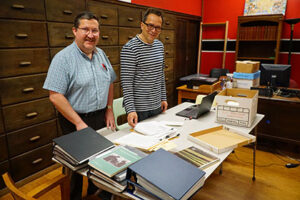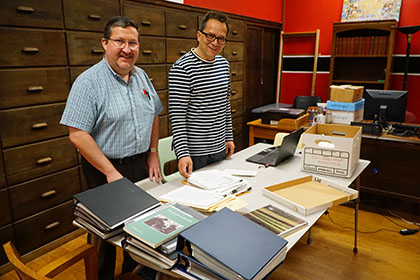By Jordan Green, Editor-in-Chief
Millions of Americans have ancestors who moved from Germany to Russia before coming to the United States. Yet most know nothing about their German-Russian heritage.
That’s something a researcher at the University of Oldenburg in Germany wants to educate more people about – and his efforts to unearth lost history led him to Northwestern on Monday.
Dr. Hans-Christian Petersen came to Northwestern at the end of a roughly two-week trip across the United States to find more information about the heritage and culture of German-Russian people in North America, specifically the Midwest.

“On the one hand, it is a big topic because it is a big group,” Petersen said. “On the other hand, there’s almost nothing known about the group.”
FINDING LOCAL TIES
People from central Europe began immigrating to Russia in the 1760s as a result of the Seven Years War. Russian leaders promised refugees land, religious liberties and exemption from military service. Yet the conditions those immigrants found upon their Russian arrival weren’t what they expected, Petersen said.
In the 1860s, Russian leaders mandated that all men would be required to serve in the military, even those who came from central Europe. That didn’t bode well with some central Europeans, many of whom were pacifists for religious reasons. Soon, they began moving to North and South America, including the Great Plains region of the United States.
Some Northwest Oklahomans have German-Russian heritage, but that’s not the primary reason Petersen came here. He came to peruse a collection of documents maintained by Northwestern history professor Dr. Eric Schmaltz.
Schmaltz and Petersen met through their research and an international academic conference Schmaltz spoke at in 2015. Schmaltz has published articles in both the English and German languages about German-Russian history and figures, including Dr. Karl Stumpp, a German ethnographer and Nazi socialist dubbed the “patriarch” of German-Russian studies.
Schmaltz and researcher Samuel Sinner gathered documents and information to write the book “The Nazi Ethnographic Research of Georg Leibbrandt and Karl Stumpp in Ukraine, and Its North American Legacy” in 2000. Schmaltz keeps the collection at Northwestern and gave Petersen unlimited access.
Northwestern is the last stop on Petersen’s American journey, which has included research in Pennsylvania, North Dakota and Nebraska. He began researching German-Russian ancestry about a year ago.
“I never thought it would take this long,” Petersen said. “I have more than 10,000 documents uploaded to my Dropbox.”
Petersen estimates that he is one of fewer than five academics studying German-Russian heritage who doesn’t have German-Russian ancestry. By using a scientific approach to his studies, he said he hopes his efforts will open up new research perspectives – and help people learn more about the world around them.
“For the future, we should try to strengthen the cooperation between the Russian-Germans here and in Germany and in the United States,” Petersen said.
LIKING NORTHWESTERN
Petersen said he’s enjoying his time in Alva. He and Schmaltz have toured the countryside, driving west along Highway 64 to get a view of the wide open spaces and canyons near Freedom.
They’ve also driven around the remains of Alva’s World War II prisoner-of-war camp and dined at El Maya, a local Mexican restaurant.
“What is really amazing, in general compared to Germany, is the people are really open and really friendly,” Petersen said. “There’s more conversation – ‘Can I help you?’ and so on. That’s really different from Germany.”

